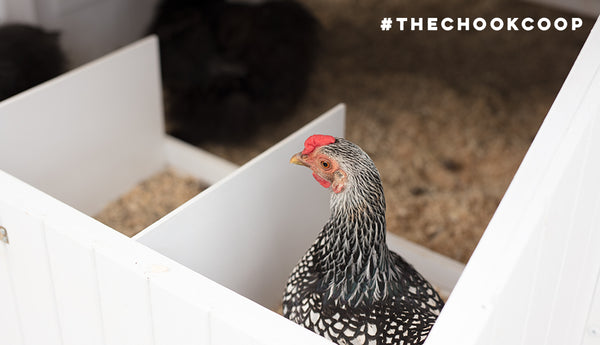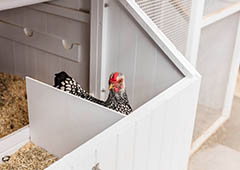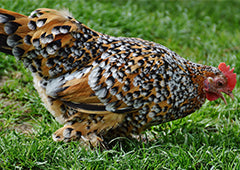A broody hen, if you don’t intend them to be mothers, can be a bit of a nuisance. After all, a broody hen is a moody hen!
What does a broody hen do?
Essentially, when a hen goes broody, they are wanting to hatch their eggs themselves. This means they are ready to lay multiple eggs, and then sit on them until they hatch.
This all sounds wonderful and motherly, but the reality can be far more frustrating. Broody hens can often try and hatch unfertilized eggs - a futile act that results in an aggressive reaction every time you try and collect your breakfast!
So if you’ve noticed the following behaviour amongst your girls, you may have a broody hen on your hands:
- Scattered breast feathers in the nesting box is something that broody hens do, as they are trying to warm the environment for their incoming chicks.
- Broody hens will exhibit aggressive behaviour - no matter how complacent they were before! If you try and take her eggs, she will puff out her feathers and create an absolute ruckus.
- A broody hen will stay in her nest virtually all day, only leaving for meals and to go to the bathroom.
If you’re not planning on your hen hatching eggs anytime soon, then a broody hen will be a serial nuisance standing between you and your fresh produce.
What can I do to stop them?
If the hen isn’t sitting on or hatching fertilized eggs, then you really should take action on her behaviour - as it can actually negatively impact her health if she’s exhibiting such behaviour for longer than usual. When hens go broody, they eat dramatically less than usual, excrete less frequently and generally push their own needs aside for that of their eggs - so its critical to break their behaviour early, lest they become sick.
Here are some preventative measures to discourage the broody behaviour before it occurs:
- Collect the eggs multiple times a day so there aren’t any lying in the nesting boxes for long
- Hang curtains or drape other material over the nesting box to conceal the eggs away from the hens sight.
If it’s too late and your hen has already turned into a ball of puffed up feathers, here’s some strategies to ‘break’ her broody behaviour. Remember, the longer you leave it, the longer it will take to rectify:
- A wire cage in a well lit location - it sounds harsh, but placing your broody hen in this cage until they calm down (depending on how long they were broody depends on how long they need in the cage) is one of the most proven methods. They may need to be in there a few days, maybe even a week depending on the length of time they were broody. To find out whether their time in the cage is up, release them out and watch their behaviour. If they run back to the eggs, then they aren’t ready for freedom!
- The ‘boomerang’ method of removing a hen from the coop has had varying degrees of success, but might be worth a try in the early stages of broodiness. It involves repeatedly taking the hen out of the nest every time they sit stubbornly on their eggs. Some say this method works, others report that the hens simply sit before running back to their nest at the first opportunity.

The key is to try and catch broodiness early, as that means it can be rectified faster. Broody hens will return completely to normal after you’ve broken their behaviour, and will start being productive egg-layers again soon after!
Alongside dealing with broody hens, we chicken keepers want to do an eggcellent job when caring for our feathered friends. To prevent and identify health concerns effectively, make sure that you've got the knowledge you need to raise happy, healthy chooks. Did you know 67% of chicken keepers surveyed experienced a chicken health or behaviour issue in the first 12 months that they didn’t know how to handle?
But don’t worry! Our feathered friends over at Chickenpedia have created a Chicken Healthcare Course. It is a comprehensive online course that covers everything you need, including what to look for in an unhealthy chicken and how to support your egg-laying hens to optimal health. All of their courses are really well structured and filled with vital information, which is why I highly recommend them to all of my readers! From raising baby chicks to feeding to behavior, you’ll find valuable information that’ll give you the knowledge and confidence to successfully look after your chickens.
Check out Chickenpedia today. As a member, you will also get access to the ALL of their chicken courses!


















